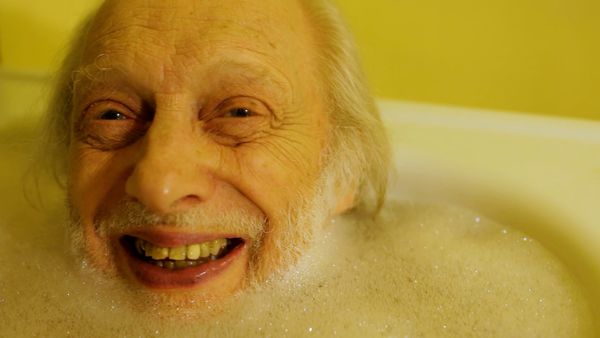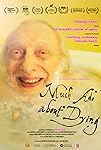Eye For Film >> Movies >> Much Ado About Dying (2022) Film Review
Much Ado About Dying
Reviewed by: Jennie Kermode

“Dost thou know the difference, my boy, between a bitter fool and a sweet fool?”
One thing, one might contend, they have in common: they often speak more wisdom than they know. Simon Chambers’ Much Ado About Dying is one of those documentaries which communicates more through observation than through its narration, which might be considered unreliable at best, and bittersweet in flavour. It’s the story of a filmmaker who finds himself caring for his eccentric elderly uncle, his own life on hold, and although its central perspective is rather simplistic, there’s so much packed in around the edges that quite different narratives emerge there, making for a complex and satisfying whole.
Uncle David was an actor once; then, for a while, a teacher. Arguably he is still both. He has two nieces, Simon’s sisters, but doesn’t want them to care for him because, he says, they are too bossy. David was in Delhi, trying to make a film about the history of the automobile called Carmageddon; in returning, he seems ready to cast himself as Cordelia, loyal and beloved, but David says he makes a better fool. They have history. “I’d spent my whole life getting him out of various scrapes,” the documentarian reveals.
David’s London home is a wreck, full of empty wine bottles, discarded soup tins , loose cables and mouse droppings. To discourage mice from going near the electrical outlets, the actor has smeared the sockets with peppermint toothpaste. Parts of the walls and ceilings have been scorched by electric heaters. Conflagration seems only a matter of time – and yet we do get some insights into how all this came about, even if Simon doesn’t grasp them. David hasn’t left the house in years. Though he spends money on others, he lives frugally himself, and accordingly he buys in bulk, trying to save money in anticipation of future needs, and holds onto things in case he might need them again. In amongst the clutter are intriguing mementos from his past whose stories we sadly never get to hear about. One might glimpse the shadow of Lear in David’s awareness that he is surrounded by treasures with no-one who can truly appreciate them.
There are other people in his life. A handsome young heterosexual pet whom he indulges and whom Simon instinctively despises. Two neighbours who enjoy his company and provide him with care. Simon complains a lot about being a carer, with little apparent comprehension of what that means for many others in that position, of how fortunate he is that his uncle has additional support. He also complains about how long it takes David to do things, and about David’s coping strategies, demonstrating a level of privileged cluelessness which the old man regards with warm humour. Every now and again, Simon tells us that David must be the way he is because he’s lonely. It does not seem to occur to the documentarian that he might be lonely himself.
Like Lear, whom he quotes throughout, David gradually deteriorates over the course of the film. As he becomes less himself, and less able to assert his desires, he becomes easier for Simon to objectify and, eventually, romanticise a little. Along the way, he is difficult and human, a man used to living on his own terms who, understandably, wishes to continue in that way; a man whose ability to entertain and outwit seems to reassure him that he has a right to exploit others in order to do so. This is not simply a film about a battle of wills or a game of manipulation, however, as the two men’s very different priorities make it, at least from Simon’s perspective, more of a mystery – again recalling something of Shakespeare’s play. It emerges as something of a culture clash comedy, but is all the more watchable for that.
Reviewed on: 11 May 2024

















